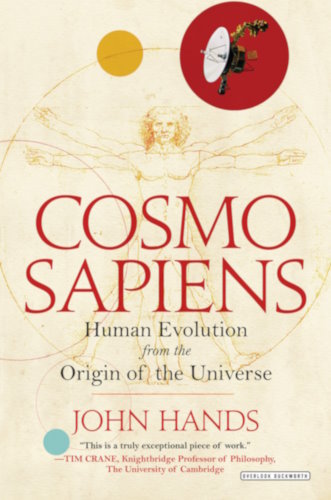Cosmosapiens, by John Hands
 The true meaning of science is to examine who we are, where are are coming from and where we are going. In Cosmosapiens: Human Evolution from the Origin of the Universe, John Hands examines the state of scientific knowledge on these matters and finds it lacking.
The true meaning of science is to examine who we are, where are are coming from and where we are going. In Cosmosapiens: Human Evolution from the Origin of the Universe, John Hands examines the state of scientific knowledge on these matters and finds it lacking.
It's not like we don't have ideas of what the universe is and where it came from, but we cling to the "orthodox" belief in some theory or conjecture rather than use the scientific method to examine evidence and refine our understanding. The modern trend of financing research only in the largely accepted knowledge areas doesn't help.
John Hands argues that regardless what the truth is, evidence should drive our choice of theoretical hypotheses and not dogma. Alas, monkeys be monkeys and science monkeys will also be monkeys. More often than not, only currently accepted theory research is funded and dissenting views are socially ostracized.
The biggest problem with Cosmosapiens is its length. John Hands could have stopped at any time, wrote four books with the same material, but instead he insisted on covering cosmology, evolution, consciousness, artificial intelligence in a single book. That makes his material repetitive and feeling, ironically, dogmatic.
I just talked to a friend about this book and he felt strongly that the book was about intelligent design and creationism. I don't agree. Hands made a huge effort of cataloguing the various theories, both accepted and ridiculed, exposing at every step the agreeing and disagreeing evidence towards every one of them.
The author decries the dogmatic resistance to any new ideas, the false certainty with which orthodox belief is presented as absolute truth: the Big Bang, Darwinian and neo-Darwinian evolution, the nature of consciousness and so on. Theories are supposedly falsifiable, but so much of the fundamental underpinnings of modern science are just unfalsifiable conjectures.
Moreover, the complexity of the universe is simplified to absurd levels in theoretical research, using Occam's Razor as another dogmatic constraint of what we can imagine the universe to be. In reality, the universe, life and everything has a much more complex dynamic, where intricately small networks lead to emergent behavior that can't be explained by simplistic models.
Bottom line: science should be carried on scientific principles, not egomaniacal or dogmatic tribalism. We might not know the exact answer to how the universe, our solar system, our planet or life on Earth started, but we owe it to ourselves to be honest about it and carry on with seeking the answers while honestly accepting what we know and what we don't know.
Comments
Be the first to post a comment